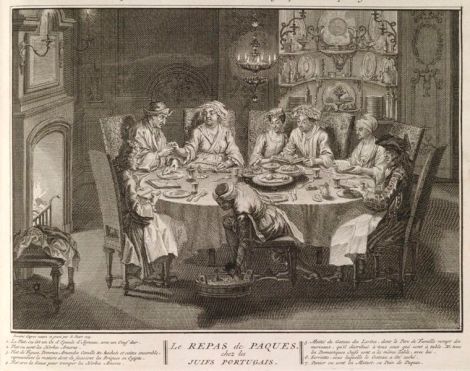Mishpatim – Sephardim and Slavery – 5776
in Rabbi Morris Blog,Rabbis' Blog
The Torah contains laws that govern slavery, whether captured in war or enslaved to pay off debts. In fact, it is no secret that Sephardim owned slaves. This is particularly true of the Western Sephardim of the 17th and 18th centuries, including those of the Caribbean, New York, Amsterdam, and London. Indeed, prayer books from that time period printed in Amsterdam even contained the blessing for converting a slave to Judaism! This was in accordance with the Biblical law that a slave must become part of one’s household and be obligated in the mitzvot.

Bernard Picart, The Passover of the Portuguese Jews, 1723
Some have erroneously asserted that Jews as merchants and plantation owners were actually the central players in the entire slave trade. While I do not believe that the activities of our ancestors should determine contemporary attitudes anyways, it is still important to set the record straight. Jews were decidedly not the primary actors. British and Dutch authorities, through the Navigation Acts and the Dutch West India Company, both denied Jews the right to engage in the slave trade, as it was deemed too profitable to share with Jews. Furthermore, for the most part, Jews were not plantation owners. While some Jews did own plantations in the early yeas of Barbados and Surinam (in the 1650s and 60s), those plantations quickly failed and their owners settled into the cities. In the cities, some wealthier Jewish merchants did own ‘house slaves,’ numbering one, two, or three saves in a household. That was, however, a far cry from the more than a hundred slaves typically kept by many plantation owners. The only time that ‘Jews’ actively engaged in the slave trade was when they were forced for centuries to live as Catholics in Portugal. However, when living as actually practicing Jews, their role was minimal relative to the terrifying immensity of the slave industry.
While from that perspective Jews may not need to contend with the broader legacy of Western slavery, as modern Jews we are no doubt troubled by the Biblical legacy. It is true, that the Torah was given at a time thousands of years ago when slavery was commonplace, and that the Torah in fact played an important role in ensuring a degree of rights to those typically considered to have none. Still, with our modern sensibilities, the Torah’s permissiveness still strikes us as troubling.
I recently had the opportunity to discuss this topic with Rabbi David Stav of Tzohar at aMizrachi UK rabbinic conference in London. He shared with me a source that he said Rabbi Aharon Lichtenstein z”l of Yeshivat Har Etzion often referenced. Rabbi Vidal of 14th century Tolosa, Catalonia writes in his Maggid Mishna, a super commentary on the Mishnah Torah (Rambam’s legal treatise), that values change over time (Shehenim 14:4). The Torah, however, supplied us with principals, such as ‘Do what is just and good’ (Debarim 6:18; see Ramban), and ‘Be holy’ (Leviticus 19:2). This was the Torah’s way of instructing us to live a life of careful consideration, to always attempt to live as morally and as justly as possible. It is our responsibility to be responsive to the times, and whilst never to transgress the Torah, to recognise that the Torah leaves it to us to apply its principles.
Rabbi Abraham Isaac Kook, the chief rabbi of British Mandate Palestine believed that from the start God sought the end of slavery. God therefore intentionally placed restrictions on the treatment of slaves to indicate to us that slaves are also people who were created in the image of God. That value would one day lead to their emancipation in the Western world. While we cannot undue the past, we must always work to ensure a better and more just today.
By Rabbi Shalom Morris

